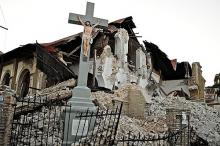renewal

WE HAVE SEVERAL readings this month where God creates something out of nothing — or at least out of pretty limited materials. In the opening chapters of Genesis, we see creation birthed from God’s imagination and curiosity. In the story of Sarah and Abraham, a child is conceived in a womb so postmenopausal that the now-pregnant woman can’t help but laugh (Genesis 18). A well appears from nowhere to quench the thirst of a dying woman and her child (Genesis 21:19). God “calls into existence the things that do not exist” (Romans 4:17). And God turns death to life through the mysteries of resurrection (Romans 6:1-11).
This month’s lectionary readings make God’s continuous creation — as well as God’s continual renewal of creation — explicit. But the fact is, once we’re looking for it, all of scripture tells these stories of renewal. God is always creating, re-creating, and reimagining our world. God is always making a way where there was no way before. God continually turns death to life. And, just as importantly, we are called to participate in God’s divine practices of continuous creation, in God’s own divine practice of everyday resurrection.
As we exit a series of some of the higher holy seasons in the liturgical year — Epiphany, Lent, Easter, and Pentecost — June quiets down from such intensity. The slower pace to which (in some places) the warm summer sun calls us can inspire us to seek out everyday resurrection wherever God hides it. How is the Spirit calling you to partner with divine practices of renewal, with everyday resurrections?

There’s a beautiful moment in Lenny Abrahamson’s Room (now in limited release) in which the character Ma explains the reality of their situation to her bewildered son. Contrary to what she had taught up until that point — that they were the only people in the entire realm of existence, which was limited to the room in question — she explains that they are actually held hostage in a small garden shed in their captor’s backyard. Sensing that Old Nick, her kidnapper and Jack’s father, might kill them because he will lose his house, Ma enlists her son’s help in an escape plan.
In shock and denial he says, “I want another story.”
Ma replies, “This is the story you’ve got.”

I am in a lovely college town to help a congregation discern its path forward.
It faces challenges that many church leaders will recognize: leadership, finances, isolation from the surrounding community, not enough young and middle-age adults to carry the congregation forward.
It also has pluses. The members aren’t deeply divided or mired in distrust and disdain. They aren’t afraid of change. They don’t bury the future in grand laments about a lost “golden age.”
I think they have a good shot at turning a corner and building a healthy next phase. I hear reports from across the nation that things are improving for Christian congregations. A new generation of clergy is exploring new ideas. Fresh energy is emerging. Denial is losing its hold, as congregations whose average age is 60 to 65 realize they must change or die.
Denominations are slower to adapt, but they, too, are moving forward in practical ways such as training in leadership and stewardship, and flexible deployment of resources.
Yet for this fresh day to last, church leaders will need to embrace a truth that goes beyond organizational development and resolving present issues. It’s a truth that many congregations simply cannot hear.
That truth is this: There is too much shallowness, not enough depth.
Over the years, in a process that isn’t at all unusual, we have equated faith with attending Sunday worship, maybe pitching in on a committee, and forming friendships within the fellowship. People enjoy belonging to the congregation. They radiate a palpable joy in being together. They seem content.
IN 1998, AWARD-WINNING writer Linda Lawrence Hunt and her husband, Jim, were forced to consider a question no parent wants to ask: How do you find meaning in life after losing your child?
Their 25-year-old daughter, Krista Hunt Ausland, had just died in a bus accident in Bolivia while volunteering with the Mennonite Central Committee.
“Your joys become more intense,” consoled a friend whose family had also lost a child.
This resonated with Linda, especially since Krista was known for her energy and enthusiasm. Linda and her husband, now retired professors of English and history at Whitworth University, had always encouraged Krista to travel and take part in community service, but even they were amazed by the intense joy Krista exuded serving as a school teacher in inner-city Tacoma, Wash., or volunteering in poor communities in Latin America. Writing about that joy might help to recover some of it in Linda’s own life, she thought.
Fifteen years later, Linda’s newest book is more than just an ode to a remarkably happy daughter. Pilgrimage through Loss: Pathways to Strength and Renewal after the Death of a Child is a collection of ideas and insight from more than 30 parents who decide in their darkest hours to “face grief in creative and intentional ways.” The book, which contains study questions at the end of each chapter and references new research on grief, is intended as a resource for grieving parents, as well as for those hoping to support them in the right ways and at the right times. “Closure is an illusion,” explains Linda, but she describes multiple examples of parents finding strength and even joy in sacred spaces and rituals, as well as in giving and receiving symbolic acts of kindness.
FORGIVENESS IS wholeness, Nobel Peace Prize winner Archbishop Desmond Tutu and his daughter, Anglican minister Rev. Mpho Tutu, write in their newest collaboration,The Book of Forgiving. Scientific research shows that forgiveness has the power to transform us in spiritual, emotional, and even physical ways. That evidence is paired with the Tutus’ collective experience in counseling, studying, and teaching and their personal stories about the difficulty of forgiving. Archbishop Tutu writes about learning to forgive his abusive father. Mpho, who writes about learning to forgive the man who murdered her housekeeper in her home, is pursuing a PhD in the topic of forgiveness.
The book lays out some simple but critical truths: Everyone can be forgiven. Everyone deserves forgiveness. You must be willing to forgive. Forgiveness is not a weakness, nor a luxury. Forgiving others is a way to practice forgiving yourself. Through forgiveness, we all become whole again. Unconditional forgiveness is an act of grace that frees all parties from further indignity, and from self-blame and corrosive hatred.
The path to forgiveness seems simple enough when you can navigate it in four easy-to-follow steps: Tell the story. Name the hurt. Grant forgiveness. Renew or release the relationship. The path is also—sorry—a bit pedestrian. That doesn’t mean the route map isn’t useful. But the book will be most applicable if you have struggled to forgive or feel that even contemplating forgiveness is an impossible burden weighing heavy on your heart and soul. If you’re carrying a load you can’t seem to gracefully shrug off or leave by the side of the road, the Tutus can help you chart the course.

And fallen, fallen light renew!
—William Blake
Thou, this humid cloak at dusk, a blue
Air flattened, smoldering the same
Field for years. Oh, Thou—this hardened name
For You not joyously sprung, not grown to grace
WHEN I FIRST started attending the Church of the Apostles in Fairfax, Va., we had no church building and met in the cafeteria of an elementary school. There were about 50 of us and a brand new priest, Rev. H. Lawrence Scott (“Call me Renny”). It was an Episcopal church in Fairfax County in the 1970s. Really, how much trouble could I get into?
What I didn’t know was that it was a charismatic, Bible-believing, tongues-speaking church. The praise band led us in worship. We sang and raised our hands. There was speaking in tongues and interpretation.
When I committed my life to Jesus in October 1977, I was sitting in the living room with Renny and his wife, Margaret. We had lunch. We talked. I disagreed with them about this Jesus stuff. We talked some more, and I was shocked to find myself saying “yes” when Renny asked if I was ready to commit my life to Jesus. I just said sure—then Renny made me pray. I remember walking to the car and having a brief conversation with God, the culmination of which was that I said I would never be a missionary to Africa. It’s funny what I thought were the key questions then.
Because I am an all-or-nothing person, I threw myself entirely into this new life. Within a few weeks I was baptized in the Spirit. I went to a Bible study every week. When I heard you were supposed to have a quiet time, I did that religiously. Every morning I sat and waited on God: Bible reading and prayer, other spiritual reading, and index cards to help me remember. Every morning for years I got up very early and met with Jesus in the quiet before dawn. Between my study and the praise songs we sang at church, I learned hundreds of scriptures by heart.
AMID THE COUNTRY'S serious fiscal problems, our $775 billion annual defense budget, not to mention our tens of billions of dollars spent on intelligence and other national security expenses, is treated as sacrosanct. Budget-cutters, especially on the Republican side, do not train their sights on the defense budget as they seek to address our flood of red ink, but instead focus on dramatic cuts in the safety net for the poor.
According to former Reagan budget director David Stockman, our $775 billion defense budget is nearly twice as large in inflation-adjusted dollars as the defense budget of Dwight Eisenhower for 1961, during the Cold War. Our FY 2011 defense budget was five times greater than that of China, our nearest competition for this dubious honor; constituted over 40 percent of the world’s entire military spending; and was larger than the cumulative budget of the next 14 nations in the top 15. All of this occurs at a time when our infrastructure is crumbling, our schools are sliding, and one-sixth of our population cannot find or has stopped looking for full-time work.
Stockman suggests that no plausible national defense goals today justify this level of defense spending. He rightly points out that “we have no advanced industrial state enemies” akin to the USSR of Cold War days. He argues that what in fact supports a budget of this size is an ideology of “neoconservative imperialism” and an attempt to function as a “global policeman” even after the world has “fired” us from this role.

How does one dig out from under such tragedy? How does one have hope for a better life, for a new Haiti?
In a meditation titled "The Gates of Hope," Minister Victoria Safford writes:
"Our mission is to plant ourselves at the gates of hope -- not the prudent gates of Optimism, which are somewhat narrower; nor the stalwart, boring gates of Common Sense; nor the strident gates of self-righteousness ... nor the cheerful, flimsy garden gate of 'Everything is gonna be all right,' but a very different, sometimes very lonely place, the place of truth-telling, about your own soul first of all and its condition, the place of resistance and defiance, the piece of ground from which you see the world both as it is and as it could be, as it might be, as it will be; the place from which you glimpse not only struggle, but joy in the struggle — and we stand there, beckoning and calling, telling people what we are seeing, asking people what they see."
Indeed, we need to plant ourselves at the gates of hope and work toward a just peace, on Earth as it is in heaven.
At the Wild Goose Festival in North Carolina last weekend, I was able to speak with Anna Clark, author of Green, American Style, president and founder of EarthPeople, a green consulting firm, and a contributor to Taking Flight: Reclaiming the Female Half of God's Image Through Advocacy and Renewal. Anna has a heart for equipping churches to make small and big changes for the sake of creation care and stewardship of the earth's resources. How can Christians do this, you ask? Read our conversation to find out.
I arrived in the faith-based advocacy community in Washington, D.C. fresh out of divinity school.
"Dallas needs this."
Those are the two statements Aaron Graham (Sojourners' Justice Revival Coordinator) and I heard over and over again as we visited pastors and other community leaders all over the city, lifting up the vision of a Dallas Justice Revival.